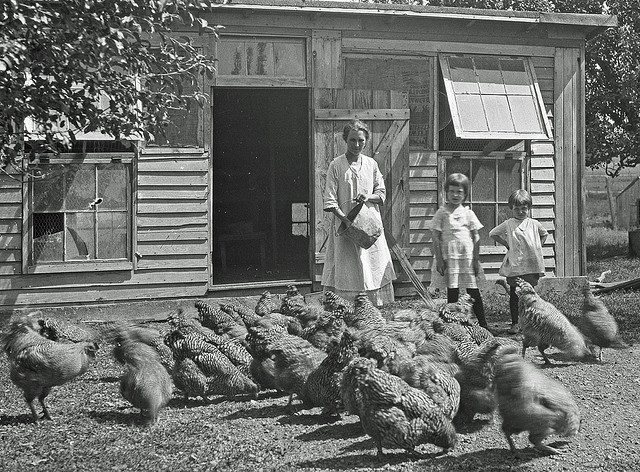
When I was growing up in the 1950’s—before there was such a thing as cruelty to animals—kids would receive live chicks in their Easter baskets.
My sister and I got some once, and it seemed like all of a sudden we had dozens of grown chickens.
“We’re gonna eat the chickens,” my father announced one day.“Won’t it be great to have fresh chicken? You girls can have a chicken farm.”
“What d’ya know about chicken farms?” My mother cried, “You were raised in a row house in South Philly. And who’s gonna clean all those chickens, anyways?”
“Don’t worry about cleaning chickens,” my father waved his hand, dismissing her. “I’ll clean the chickens.”
Later, one afternoon he called me and my sister out to the backyard. He was going to kill his first chicken.
“Come on girls. We’re gonna have fresh chicken cacciatore for dinner tonight.”
“Can’t you just kill that poor chicken by yourself, Salvi?” My mother yelled out the kitchen window. “Do you have to drag the girls into it?”
But my father needed an audience for everything, so my sister and I followed him into the coop and watched as he somehow managed to grab a chicken, tie its legs together and hang it from a nail on the fence, trying to look as if he’d done it a hundred times before—which, of course, he hadn’t.
Chop! Squawk! Chop!
He chopped away at the chicken’s neck with my mother’s meat cleaver. The chicken squawked, and he chopped, and when the squawking and chopping was finally over he turned toward us holding a disembodied chicken head aloft in his bloody hand like a trophy.
It was awful.
My father had a crazed look on his face.
I couldn’t look at him.
There was chicken blood everywhere.
Flap! Flap! The presumably dead, headless chicken wiggled its feet off the nail and hit the dirt with a squirting thud and my sister and I screamed and watched in horror as the headless chicken ran wildly all around the chicken coop while blood flew out of its chopped off neck.
“Get out, girls! Get out!”
Me and my sister and my dad all scrambled out of the chicken coop and I turned around just in time to see the other chickens start to peck and pull away at the flopping, twitching, so-called dead headless chicken.
“Damned cannibals,” my father swore, and threw the chicken head he still had in his hand back into the gory scene.
My mother fixed spaghetti with garlic and oil for dinner that night.
Weeks and weeks went by, and we still had the chickens. We just kept feeding them leftovers—including leftover chicken, which we bought at the grocery store.
“Chickens eat anything,” my father said disgustedly.
Then, one day my mother finally insisted, “You’ve got to do something about those chickens, Salvi,” and when my father resentfully asked her just what the hell did she expect him to do she answered him in Italian, with lots of hand gestures.
I knew something was going on one Sunday afternoon when I went out to the back porch and saw my father running hunched over all around the chicken coop. I could see feathers flying and hear frenzied squawking as every now and then my father would stand up and, holding a chicken in his hands, turn his back to the porch. From where I stood, crouched behind a pillar, I watched as he pushed down on something with his arms and, after a few seconds, threw limp bunches of wet feathers into the incinerator.
I put my hand to my mouth. Oh my God. My father was drowning the chickens—and burning their wet, drowned carcasses in the incinerator.
For years, my family would laugh and laugh about the time my father decided to have a “chicken farm.” The story became lore that bonded us together in the telling and retelling. I have never forgotten the gruesome, yet hysterically funny moment of the headless chicken—or the crazed look on my father’s face and the seeming fear that over took him.
But more importantly, I have also never forgotten the resolute, determined way he was hunched over that Sunday afternoon while I secretly watched.
Nobody ever talked about him drowning the chickens.
Certainly that was not what my father had in mind when he talked of “living the farm ways.” Certainly drowning chickens wasn’t as purposeful as killing chickens to eat for dinner. In fact, drowning chickens was an admission of defeat; it was letting go of a fantasy or of a dream and literally, having that dream go up in smoke.
But it was more than that too.
When my father walked back in the house that day, he saw me crouched on the porch and realized that I had been watching him. A look passed between us.
“Sometimes,” he said, gesturing with his hands before he went in the house, “you just have to do what you have to do.”
In that moment, it didn’t matter to me whether my father had slaughtered the chickens so we could have them for dinner or whether he had drowned them. In that moment of watching him, as he put it, “do what he had to do,” no matter how unpleasant, no matter how much he would rather have done something else, I saw what it took to be more a grown up than a child and I felt something I had never felt before.
While my 10-year-old self wouldn’t have been able to put a words to it, I later understood that what I was feeling was respect.
“It’s okay, Daddy,” I responded, “I never liked chicken all that much anyway.”
~
Author: Carmelene Siani
Editor: Toby Israel
Photo: Don O’Brien/Flickr

 Share on bsky
Share on bsky






Read 5 comments and reply